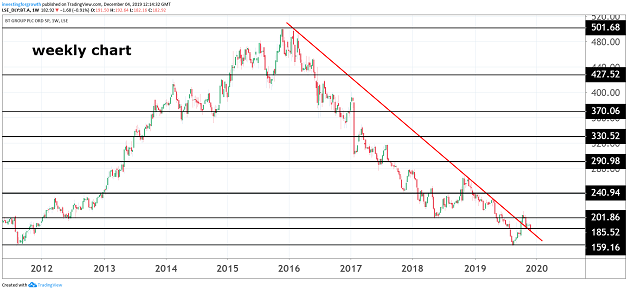Are BT shares about to revisit eight-year low?
UK stocks might rally post-election, but it’s not only dividend cut fears spooking analysts.
4th December 2019 12:35
by Graeme Evans from interactive investor
UK stocks might rally post-election, but it’s not only dividend cut fears spooking analysts.

Long-suffering BT (LSE:BT.A) investors eyeing a favourable post-election bounce in UK domestic stocks were today urged to use any rally as an opportunity to sell.
The stark message from Deutsche Bank's telecoms team reflects BT's “necessary rather than optional” investment in meeting the UK's stretching full-fibre broadband targets, with the inevitable consequences for cashflow targets and future dividend payments.
Deutsche stuck by its 165p target price today, which is near to the multi-year low set by struggling BT in late August. The stock has been on a rollercoaster ride since then, with October's rally and relief over an unchanged half-year dividend undone in recent weeks.
Sentiment hasn't been helped by Labour's plan to nationalise BT Openreach, which is the telecom giant's infrastructure division responsible for rolling out the high-speed broadband network across the UK.

Source: TradingView Past performance is not a guide to future performance
Even if Jeremy Corbyn doesn't get the keys to No 10, there will be no hiding place for BT investors from the balance sheet strain of reaching a target of four million full-fibre broadband premises by March 2021 and an expected country-wide roll-out by 2025.
The City's estimate that this will mean higher incremental capex of £500 million a year has put analysts on standby for a sizeable dividend cut, although as we reported in October it would be “illogical” for BT to reveal its hand too early while in negotiations with regulator Ofcom.
Analysts at Jefferies have speculated that a 20% dividend cut might be the tactical concession from CEO Philip Jansen that clinches a favourable regulatory outcome in 2020. Morgan Stanley went further last week, predicting a cut of 35% to 10p a share in March 2021.
In the meantime, however, it's possible that BT shares will be driven more by market forces as lower Brexit risk following the election boosts the pound and benefits domestic stocks.
Morgan Stanley pointed out that UK domestics have underperformed exporters by 18% in the last three years, with BT also lagging those domestic stocks. The shares are down 62% from their November 2015 highs, with the forward price/earnings multiple less than 8 times.
Today's note from Deutsche suggests no respite for BT's beleaguered army of small shareholders, with full-year earnings estimates lowered for 2020 and 2021.
Recommending that investors sell into any share price strength, the bank's analysts said:
“Whilst a Conservative Party victory may see a higher pound, reversion to private sector solutions for low UK full-fibre penetration are unlikely to be positive for BT, which controls 80% of UK broadband infrastructure — a position we see as under assault.”
These threats are likely to include new ownership for FibreNation, which is being sold by TalkTalk after the business set out plans to build its own ultrafast network reaching three million customers. A sale was delayed by uncertainty over the Labour nationalisation plan.
BT was also a dealt blow earlier this month when Virgin Media said it was switching its three million mobile phone customers to Vodafone's network from 2021. The contract is reportedly worth £200 million to BT.
Deutsche added:
“We see BT shares as hamstrung relative to the sector due to low infrastructure value and above average risk from competition.”
Full performance can be found on the company or index summary page on the interactive investor website. Simply click on the company's or index name highlighted in the article.
These articles are provided for information purposes only. Occasionally, an opinion about whether to buy or sell a specific investment may be provided by third parties. The content is not intended to be a personal recommendation to buy or sell any financial instrument or product, or to adopt any investment strategy as it is not provided based on an assessment of your investing knowledge and experience, your financial situation or your investment objectives. The value of your investments, and the income derived from them, may go down as well as up. You may not get back all the money that you invest. The investments referred to in this article may not be suitable for all investors, and if in doubt, an investor should seek advice from a qualified investment adviser.
Full performance can be found on the company or index summary page on the interactive investor website. Simply click on the company's or index name highlighted in the article.